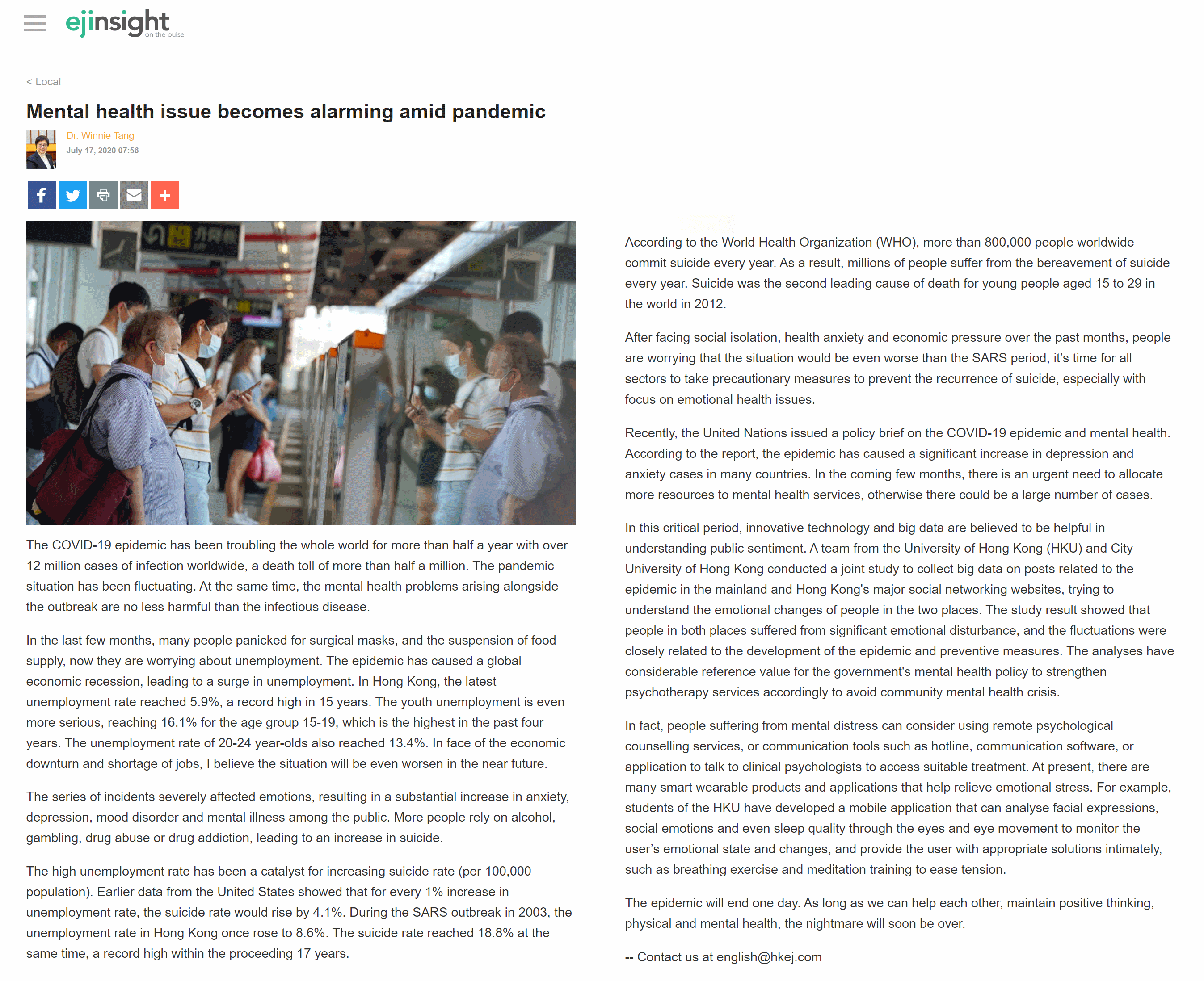網上版請按此

Mental health issue becomes alarming amid pandemic
The COVID-19 epidemic has been troubling the whole world for more than half a year with over 12 million cases of infection worldwide, a death toll of more than half a million. The pandemic situation has been fluctuating. At the same time, the mental health problems arising alongside the outbreak are no less harmful than the infectious disease.
In the last few months, many people panicked for surgical masks, and the suspension of food supply, now they are worrying about unemployment. The epidemic has caused a global economic recession, leading to a surge in unemployment. In Hong Kong, the latest unemployment rate reached 5.9%, a record high in 15 years. The youth unemployment is even more serious, reaching 16.1% for the age group 15-19, which is the highest in the past four years. The unemployment rate of 20-24 year-olds also reached 13.4%. In face of the economic downturn and shortage of jobs, I believe the situation will be even worsen in the near future.
The series of incidents severely affected emotions, resulting in a substantial increase in anxiety, depression, mood disorder and mental illness among the public. More people rely on alcohol, gambling, drug abuse or drug addiction, leading to an increase in suicide.
The high unemployment rate has been a catalyst for increasing suicide rate (per 100,000 population). Earlier data from the United States showed that for every 1% increase in unemployment rate, the suicide rate would rise by 4.1%. During the SARS outbreak in 2003, the unemployment rate in Hong Kong once rose to 8.6%. The suicide rate reached 18.8% at the same time, a record high within the proceeding 17 years.
According to the World Health Organization (WHO), more than 800,000 people worldwide commit suicide every year. As a result, millions of people suffer from the bereavement of suicide every year. Suicide was the second leading cause of death for young people aged 15 to 29 in the world in 2012.
After facing social isolation, health anxiety and economic pressure over the past months, people are worrying that the situation would be even worse than the SARS period, it's time for all sectors to take precautionary measures to prevent the recurrence of suicide, especially with focus on emotional health issues.
Recently, the United Nations issued a policy brief on the COVID-19 epidemic and mental health. According to the report, the epidemic has caused a significant increase in depression and anxiety cases in many countries. In the coming few months, there is an urgent need to allocate more resources to mental health services, otherwise there could be a large number of cases.
In this critical period, innovative technology and big data are believed to be helpful in understanding public sentiment. A team from the University of Hong Kong (HKU) and City University of Hong Kong conducted a joint study to collect big data on posts related to the epidemic in the mainland and Hong Kong's major social networking websites, trying to understand the emotional changes of people in the two places. The study result showed that people in both places suffered from significant emotional disturbance, and the fluctuations were closely related to the development of the epidemic and preventive measures. The analyses have considerable reference value for the government's mental health policy to strengthen psychotherapy services accordingly to avoid community mental health crisis.
In fact, people suffering from mental distress can consider using remote psychological counselling services, or communication tools such as hotline, communication software, or application to talk to clinical psychologists to access suitable treatment. At present, there are many smart wearable products and applications that help relieve emotional stress. For example, students of the HKU have developed a mobile application that can analyse facial expressions, social emotions and even sleep quality through the eyes and eye movement to monitor the user's emotional state and changes, and provide the user with appropriate solutions intimately, such as breathing exercise and meditation training to ease tension.
The epidemic will end one day. As long as we can help each other, maintain positive thinking, physical and mental health, the nightmare will soon be over.
Dr. Winnie Tang
Adjunct Professor, Department of Computer Science, Faculty of Engineering; Department of Geography, Faculty of Social Sciences and Faculty of Architecture, The University of Hong Kong